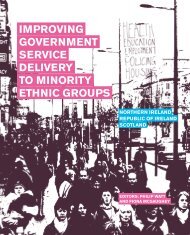4858 Mental Health Report - National University of Ireland, Galway
4858 Mental Health Report - National University of Ireland, Galway
4858 Mental Health Report - National University of Ireland, Galway
Create successful ePaper yourself
Turn your PDF publications into a flip-book with our unique Google optimized e-Paper software.
Methodology<br />
Lifestyle risk factors relating to mental health and well-being may include<br />
cigarette smoking, alcohol consumption, dietary habits, physical activity, illegal<br />
substance use and body mass. Each <strong>of</strong> these indicators can be measured using<br />
single item or batteries <strong>of</strong> questions. The accuracy and precision <strong>of</strong> the selfreported<br />
information is affected by the measure used and the way the question is<br />
framed.<br />
Using the above criteria, the collected data sources were reviewed, examining<br />
their comparability and compatibility and identifying strengths and weaknesses in<br />
terms <strong>of</strong> harmonisation. The findings from this section are presented in<br />
Chapter 6.<br />
Phase 2: Methodology common to Strand A and B<br />
Much <strong>of</strong> the methodology employed in Phase 2 <strong>of</strong> the project was common to<br />
both strands A and B. The core objectives <strong>of</strong> dissemination <strong>of</strong> findings, and<br />
development <strong>of</strong> practice and policy which will facilitate cross border collaboration<br />
and harmonisation <strong>of</strong> mental health surveillance, interweave both strands.<br />
Therefore, the majority <strong>of</strong> methods described below relate to both Strand A:<br />
Collaborative <strong>Mental</strong> <strong>Health</strong> Promotion Practices, and Strand B: Compatibility and<br />
Comparability <strong>of</strong> <strong>Mental</strong> <strong>Health</strong> Data.<br />
Dissemination <strong>of</strong> Findings from Phase 1<br />
Interim <strong>Report</strong><br />
When the interim report was published, copies were sent from the Centre for<br />
Cross Border Studies to all who had participated in Phase 1 <strong>of</strong> the study, including<br />
practitioners, voluntary and community groups, researchers and policy makers.<br />
Study Day at the Centre for Cross Border Studies<br />
Accompanying the interim report was an invitation to attend a study day on 6th<br />
September 2001 in the Centre for Cross Border Studies in Armagh. The purpose <strong>of</strong><br />
this day was to disseminate the findings from Phase 1 and to invite reflections on<br />
the information presented.<br />
A total <strong>of</strong> 119 people were invited to attend this study day and 45 people,<br />
representing a wide range <strong>of</strong> interests, including policy makers, health agencies<br />
and voluntary and statutory bodies, attended. Presentations based on the<br />
findings <strong>of</strong> Phase 1 were made and these were followed by a group discussion.<br />
25
















